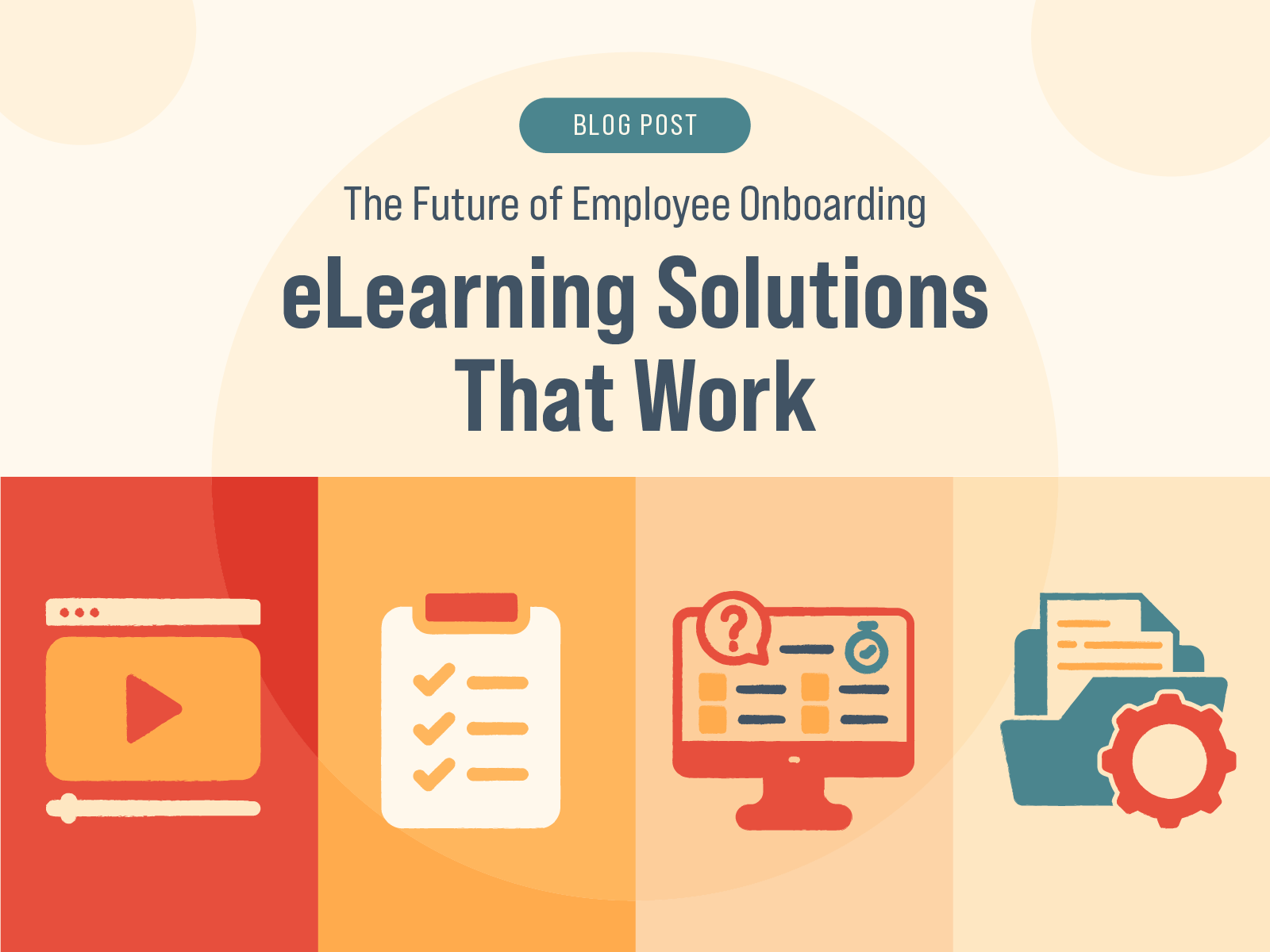8 eLearning Sales Training Best Practices: Tips & Use Cases
For many businesses, a steady flow of sales is essential to their growth and long-term success. As more companies embrace a hybrid work model and stray away from physical offices, they’re taking their sales development rep training online. There are many benefits to online sales training that we will explore in this article.
Benefits of Online Sales Training
A few years ago, online custom sales and customer support training wouldn’t even be a question. Today’s working landscape has shifted, highlighting the many benefits of sales training programs and the emergence of the eLearning industry.
Flexibility
Your sales reps may not spend eight hours a day staring at a computer. With access to online training, your sales team has the flexibility to explore the material at their own pace and on their own time. While you can still set deadlines, you’re giving employees the opportunity to interact with the lessons when it is convenient for them.
Interaction
Not everyone on your sales team is motivated day in and day out to do their best work. Providing them with engaging, custom eLearning training courses filled with knowledge assessments can ensure retention. As many courses also come with scores, it’s easy for you to see which employees are performing well and which could use additional assistance.
Easy Access to Information

eLearning gives your company and your sales team a unique opportunity to deliver information to your employees at lightning speed, even providing them real-time access if necessary. Your sales team will love the chance to present to audiences, follow up on deals, and talk with clients. In just a few clicks, they will be able to access the training information, always providing clients with the most accurate and updated information.
Documentation
Documentation helps your sales team reference information when they need it the most. All resources are saved as digital files in their respective formats—documents, podcasts, presentations, and more. In the case that an employee wants to review a piece of material such as a podcast or a video, they can easily do so.
Content Consistency and Quality
In-person training may not always be the most consistent method of learning for your sales team. Another benefit of the eLearning industry’s online sales training programs is that they provide consistent messaging to your team as a whole. The fact that all information is available online also makes it easy to update. For example, if a different promotion is available or there’s a change to an existing offer, it can instantly be updated for your team to access.
Portability
Another employee benefit of sales training is how portable the content is. Your team can log in on their smartphone, desktop, or laptop to view the latest training session. This helps to maximize attendance and reach a larger pool of people with fewer company resources. Even if a salesperson is traveling to a meeting, they can pull up the course on the commute.
The Wrong Conceptions about Sales Training
There are many misconceptions about going into sales as a profession and it presents difficulties when it comes to training. We’ve outlined some common objections that sales managers or companies will present when thinking of training their sales team:
- “Why train salespeople when they change jobs so frequently?”: The sales industry is known to have a high turnover, so companies might be hesitant to invest in sales team training even though it could help increase retention.
- “I don’t want to take sales reps away from their job”: Sales professionals are always busy and often pulled in many directions to appeal to the needs of their clients. It can seem like a sacrifice to take time away from work to conduct training.
- “All our audience needs to know is our product”: Many people associate sales training with product training. But product training overlooks important sales aspects such as negotiation, communication, confidence, etc.
- “Salespeople learn on the job”: While this is true that real-world experience is incredibly helpful for sales professionals, they still need to experience consistent, hands-on training to help them be successful.
Best Use Cases for eLearning in Sales Training

You may be curious about how to use sales training eLearning in the most effective way possible. Consider these five scenarios to get started.
Onboarding
To give your new sales reps the highest chance of success at your company, you should aim to give them a bird’s-eye view of your processes and establish a sound onboarding plan. As onboarding is a fairly cookie-cutter process, it lends itself extremely well to custom onboarding learning courses.
Product Training
Depending on the type of company you run, you may need to implement product training to help your team understand how to sell in the field. Product training is easy and straightforward through eLearning courses and eliminates the need of your sales lead to give individual training sessions time and time again. Plus, as products are updated, you can create new courses that explain their benefits and weak points.
Standards and Best Practices
All of your sales representatives should be aware of the standards that are established at your company. They should also know the ideal tools that you use to implement your work. For example, many companies use a CRM system; if you require your team to use it, create different video lessons for them to reference to get the most out of it.
Specifics of the Industry
eLearning is the most impactful when you can pass along specific expertise to your sales team. These small nuances may not seem like a huge deal but they can have a huge impact on the confidence of your sales team when they are interacting with customers in the field.
Performance Review
eLearning portals provide an opportunity to assess your team members to determine who knows the product the best. Performance reviews can occur in a routine mode where employees complete the test following a specific course to consolidate their knowledge. Performance reviews may also occur for the entire department on one day, allowing the manager to evaluate the performance.
The Limits of eLearning When Training Sales Reps
The Kirkpatrick model is one of the most popular for measuring how effective learning is in a business. This model consists of four levels of assessment:
- Level 1: reaction - did the team like the training?
- Level 2: learning - what did the team learn?
- Level 3: behavior - was the knowledge put into practice?
- Level 4: results - how did the training impact the organization?
Even if the training is high-quality and revolves around real-world scenarios, online training for sales reps usually covers the reaction and learning stages of the above approach. For example, maybe you’ve created an interactive course that has company-branded characters and gamification elements. If it is successful, your learners will have a reaction such as “wow, how cool, I like it!” This is the first level of training.
Online training is also helpful for the second level which is learning. Let’s say you provided a theory of the steps involved in the sales process and gave your team an opportunity to present new skills in a virtual client scenario. After, you gave them a test to see what information was retained. The third level can’t be covered with eLearning alone as it requires not only passing tests but applying the knowledge. Only if a mentor is sitting next to the employee on a call can determine whether or not they followed the sales step process with a customer.
8 eLearning Sales Training Tips

Now that you’re aware of the best use cases for eLearning courses in sales and call center training, let’s explore the five best practices to set you up for success.
1. Start Your Training As Soon As You Hire
The first sales training best practice is to start training your sales team as soon as a new member comes on board. This allows them to soak up as much information as possible and allows them to begin working on hitting their sales target immediately. One way to ensure a smooth training environment is through a well-designed onboarding program that can guide new team members through the information they need to know.
2. Transition to Online and Asynchronous Training
If your team doesn’t frequent an office every day, you’ll need to utilize some sort of digital sales training to be productive. Transitioning your training online can help to reduce employee disruptions and give them the freedom to get through the material when it is convenient for them. If needed, they can also rewatch older training videos as many times as needed to thoroughly soak in the information. As an added bonus, it’s possible to connect your CRM with your LMS system.
3. Gamify Your Training
The sales industry is naturally competitive, why not take advantage of this and use it to your benefit? Adding gamification and game elements such as points, badges, and a leaderboard to your online sales training and enterprise sales eLearning training, it helps encourage friendly competition within your team. Consider offering the top rep or team a prize to motivate others to take your online training courses seriously.
4. Remember that Sales Training Is not Universal
There is no such thing as one-size-fits-all sales training. Your sales team is composed of reps that have different skill levels which means they should all receive different levels of training. Some top performers might want more leadership training as they consider moving into sales management positions. Reps who don’t have as much experience might need help brushing up on the basics. Online training allows you to create a variety of models to offer effective training for every skill level.
5. Don't Forget Soft Skills

Your training should also cover the soft skills necessary to thrive in your field. This means that your sales team has the skills to connect with customers and work well with other sales team members. By providing them with content on topics such as effective communication, emotional intelligence, productivity, leadership, and critical thinking, you will create a stronger and more collaborative working environment that fosters personal and professional growth.
6. Be Practical
The best way to equip your sales team for success is to give them practical and hands-on experience. Although this isn’t always possible, it’s important that your training revolves around testing or playing with a product even if it means watching a video demonstration. Allow your learners to click and drag to see the different components or click-through prototypes to get a feel for questions the customer might ask. You can also compare your products and services to your competitors so they can see how to position your benefits.
7. Incorporate Role-Playing Activities
Role-playing or scenario-based activities are other useful approaches for enhancing learning. For online sales training, you can use videos or text to set up scenarios to allow your learners to practice different responses. This could be troubleshooting an upset client or dealing with customer objections, giving your team the opportunity to practice scripts in a risk-free environment. This will help them build muscle memory that helps them recall information on the job.
8. Always Be Cautiously Learning
Rather than thinking of training as something that only happens once in a while, thinks of it as a consistent tool to lean on to foster professional development. The sales field is constantly changing and hyper-competitive, and how to train your sales reps should always be at the top of your mind. Avoid one-off training where information will likely be quickly forgotten. Consistent learning is the best way to get the most impactful results.
eLearning for Sales Training: Allegro Media Design Can Help!
If you don’t currently have an online employee training program implemented at your business, don’t panic! It’s not too late to implement an effective training program, and our experts at Allegro Media Design can help curate beautiful and engaging courses for your business.
Don’t miss out on this opportunity to enhance your sales training for better results. Contact us directly to see how we can help your team!
More Articles


Gamification in eLearning: Why It Works and How to Implement It

The Future of Employee Onboarding: eLearning Solutions That Work

What is SCORM and What Does it Matter

Accessibility in eLearning: Why It’s Essential and How to Achieve It

Microlearning: Bite-Sized Training for Big Results

Soft Skills Training Through eLearning: Building Better Leaders

How to Write Learning Objectives for eLearning Courses

When to Outsource Your eLearning Development (and How to Choose the Right Partner)

Employee Engagement in 2025: How eLearning Can Help

Training for a Multigenerational Workforce: Meeting Everyone’s Needs

The Future of eLearning: 4 Trends Shaping the Industry

How To Find the Right eLearning Developer

What Makes eLearning Effective?

Transform Your eLearning with the Magic of Animation

How to Use Audio to Enhance eLearning

Boost Learning Efficiency with Microlearning

Give Your Dated eLearning a Fresh Facelift

The Process of eLearning Part 5: The Implementation Phase

The Process of eLearning Part 4: The Development Phase

The Process of eLearning Part 3: The Design Phase

The Process of eLearning Part 2: The Analysis Phase

The Process of eLearning Part 1

Empower Your Workforce with Self-Paced Training

Elevate Your Training with Exceptional Visual Design

Taking the Confusion Out of SCORM

Embrace Efficiency: The Power of Outsourcing Your eLearning Production

Mastering eLearning: Elevating Corporate Training Through Scenario-Based Learning

Converting ILT to vILT: Embrace the Virtual Shift

Spice Up Your Boring Corporate Training With Animated Videos Copy

From Concept to Clicks: The Crucial Role of eLearning Developers

Lost in Translation: Mastering Multilingual eLearning

Training Crossroads: ILT or eLearning – What's Your Strategy?

How to Transform Boring Compliance Training

Last-Minute Crunch? Allegro Media Delivers Rapid eLearning Solutions Just-In-Time!

The Art of Chunking (or How to Eat a Whale)

Zen & The Art of eLearning Maintenance: Finding Harmony with Allegro Media Design

How to leverage ChatGPT for eLearning Applications

What Should I Look for When Hiring an eLearning Vendor?

Unveiling the Future of eLearning: Trends to Watch in 2024

Subject Matter Experts: Be Proud! Allegro loves you just how you are!

What in the World is an LMS?

Enhancing eLearning Engagement: The Power of Scenario-Based Interaction with Stylized 3D Motion Images

Enhancing eLearning with DALL-e: Adding Visual Reinforcement for Engaging Corporate Training

Choosing the Right Authoring Tool for Your eLearning Course

High Quality Audio is ESSENTIAL in Modern eLearning

What in the World is SCORM?

A Complete Guide to Leadership Training and Development

Benefits of Customer Service eLearning Training

14 Tips To Effectively Use Audio for eLearning Courses

10 Instructional Design Tips for Effective eLearning

Why You Should Use eLearning For Product Training

Benefits of Voice Overs for Your Business

How to Create Great eLearning Content: 9 Tips

Video Marketing for Business: 10 Benefits of Promotional Videos

Gamification in the Workplace: Why and How to Use It

5 Best Practices for Training Remote Employees

How to Avoid eLearning Burnout and Fatigue

What Is Customer eLearning Training and Why Do You Need it?

How to Effectively Use Videos in eLearning

Best Practices for Remote Employees Onboarding with eLearning

Why You Should Invest in Corporate eLearning?

How Can eLearning Reduce Employee Burnout?

How to Motivate Employees to Participate in eLearning Training: 9 Tips

eLearning Trends and Predictions: 2022 Forecast

7 Reasons to Outsource Your eLearning Course Development
%20to%20Virtual%20Instructor-Led%20Training%20(VILT).jpg)
How to Convert Instructor-Led Training (ILT) to Virtual Instructor-Led Training (VILT)

12 Best Tips on How to Improve Employee Training with Gamification in 2021-2022

What Is Compliance Training and Why Is It Important for Your Business?
%20vs.%20eLearning.jpg)
Instructor-Led Training (ILT) vs. eLearning: Which Should I Choose?

The Difference Between An Instructional Designer And An eLearning Developer
















